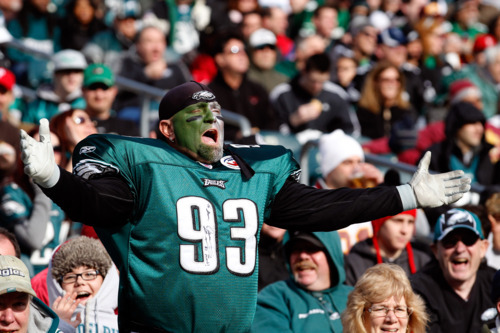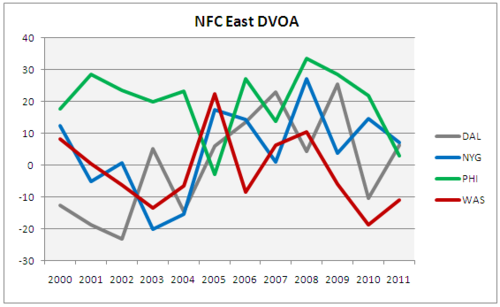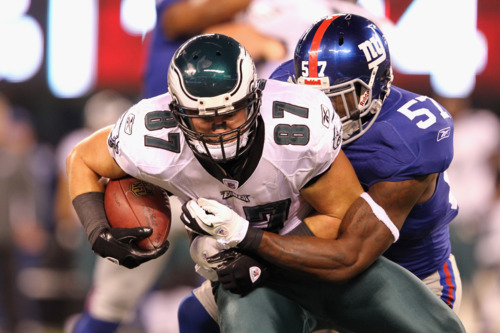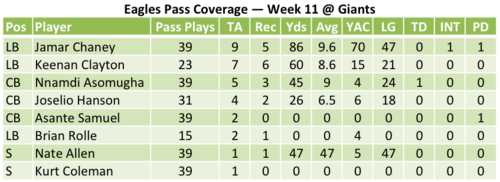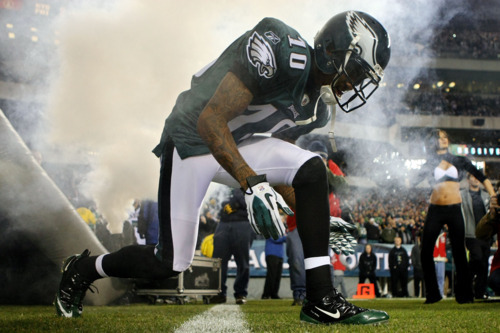Before the season started, I set my expectations for 2013 at a reasonable level: an improvement from last year's disaster squad and a foundation built for future growth. As I said then, most teams as bad as the Eagles improved, on DVOA terms, by an average of about 12%. I anticipated something along those lines, with a slight record improvement but certainly no mention of playoffs.
Obviously, I was wrong. Before Sunday's loss, the Eagles had improved by nearly 33% in DVOA, one of the best turnarounds ever. That will cool slightly this week, but the team still has the inside track on a playoff spot, something most people (including Jeffrey Lurie) never expected to happen so soon.
But Sunday's game reminded us that this squad -- or at least half of it -- is still a work in progress. Chip Kelly's offense is gangbusters, even if it can sputter out for stretches. On a "bad day," Nick Foles threw for 428 yards on 30 for 48 attempts, 3 TDs and 1 INT. Plus he ran the ball 5 times for 41 yards to boot. LeSean McCoy only got 8 carries, but still finished with over 100 yards from scrimmage. DeSean Jackson had nearly 200 receiving yards plus an end-around touchdown called back due to penalty. Oh, and rookie tight end Zach Ertz ended the day with 57 yards on 6 receptions, including a one-handed TD grab. No big problems here.
The defense is still messy, though. As I've said before, you don't have to be an elite quarterback to find the holes in Billy Davis' scheme (Hint: look for the safeties). A smart, patient, accurate player will pick this secondary apart. That's what happened when the Eagles D was skinned alive during the three-game stretch against Philip Rivers, Alex Smith, and Peyton Manning. Since then, during the team's 7-2 run, opponents never scored more than 21 points.
The great nine-game run leading up to Sunday seemed to be the defense gelling, but most of it was the horrendous, mistake-prone quarterbacks the Eagles faced. Only two of the QBs the Eagles faced in that span have positive DVOA on the year, and they played one of those in a blizzard. Matt Cassel could easily have been another one of those lightweights, but he did his best 2008 impression, throwing for the 4th-most yards of his career. That came despite the Eagles front seven holding the Adrian Peterson-less Vikings to just 2.4 yards per carry.
Worth noting: Football Outsiders never bought into the Eagles defensive turnaround. While they were bend-but-not-breaking their way to sub-22 point totals, the defense allowed over 350 yards in all but two of the last 9 games. Coming into Sunday, the team ranked 22nd in defensive efficiency, versus 3rd on offense. Even with Denver and Kansas City as past opponents, the Eagles faced the 27th-weakest schedule and registered the highest level of inconsistency in the league prior to this week. Including week 15, the Eagles have the lowest point differential of any division leader.
So again, the Eagles aren't great. If their schedule weren't so easy, including six games against the criminally ugly NFC East, I imagine the team would have finished closer to my "return to 1999" prediction than their current possible outcome of 8-10 wins. If the Eagles win the division, which I now expect them to do either against Chicago with the Cowboys losing again, or in Dallas the week after, they will have vastly overperformed -- despite being only a mediocre overall team.
But that's OK. Even if the Eagles get rolled over by a better wild card team like San Francisco, Carolina, or New Orleans, the season will have been a smashing success, and one to build on in 2014. Kelly's offense still has room to grow next year, and the defensive reconstruction will continue. Until then, enjoy this #housemoney season.

